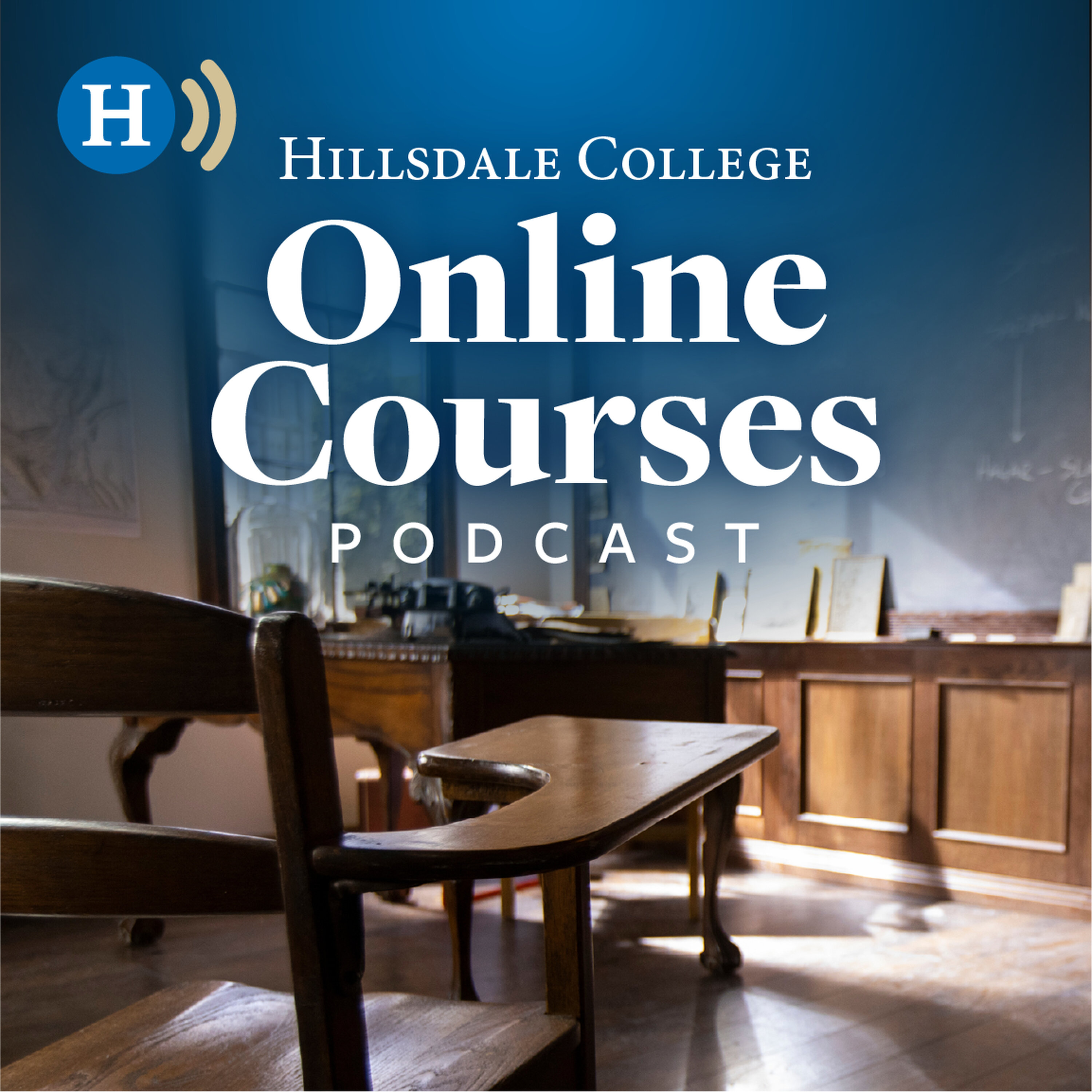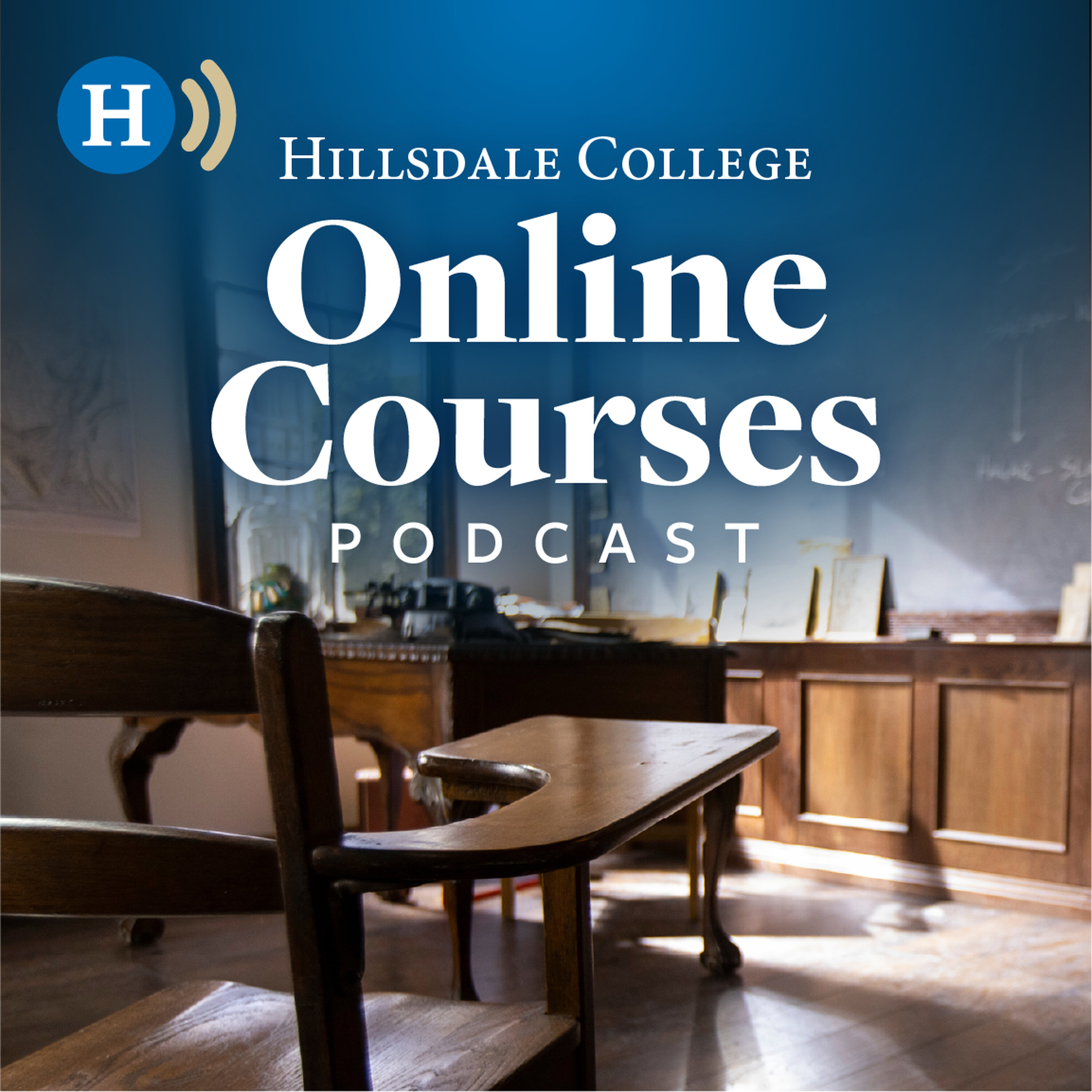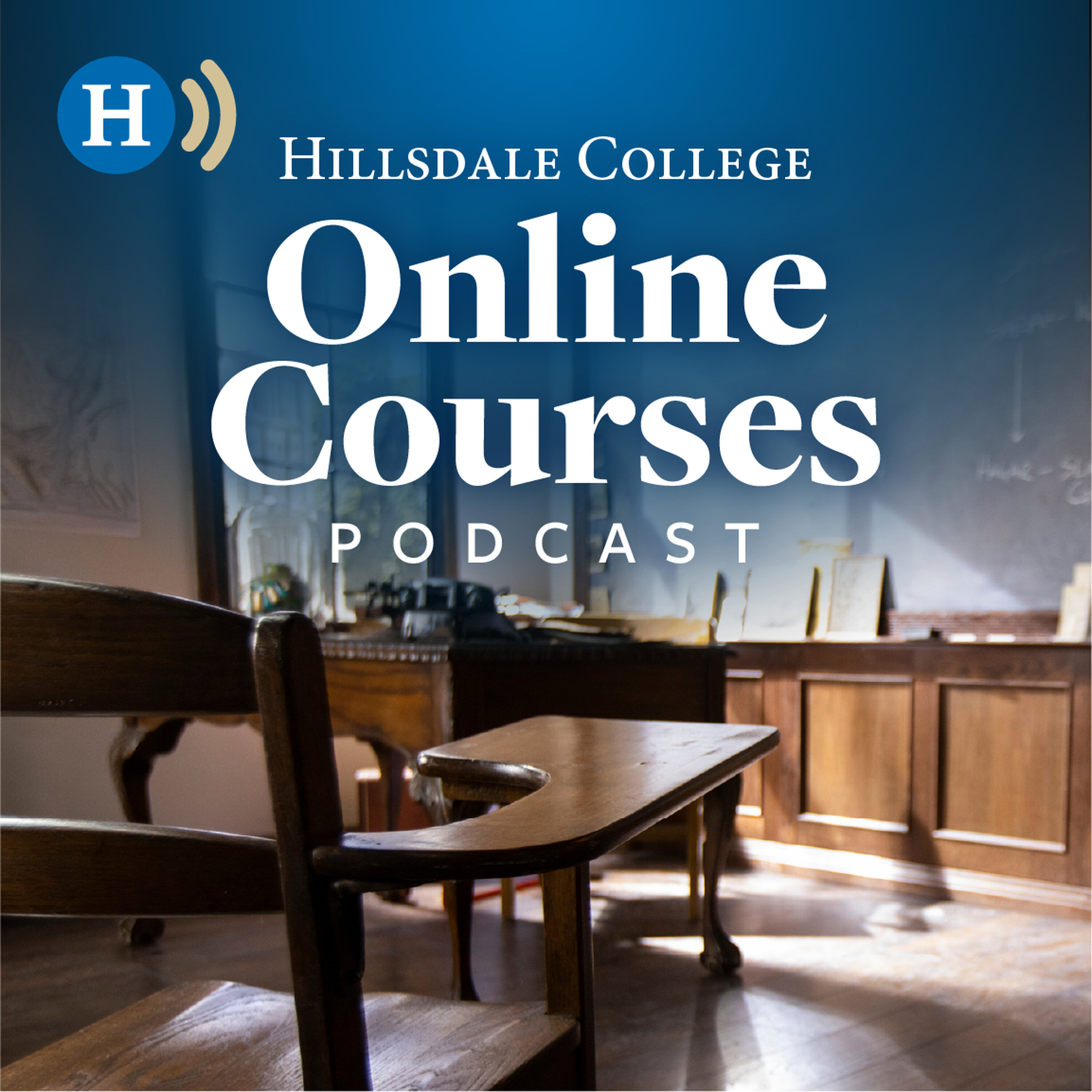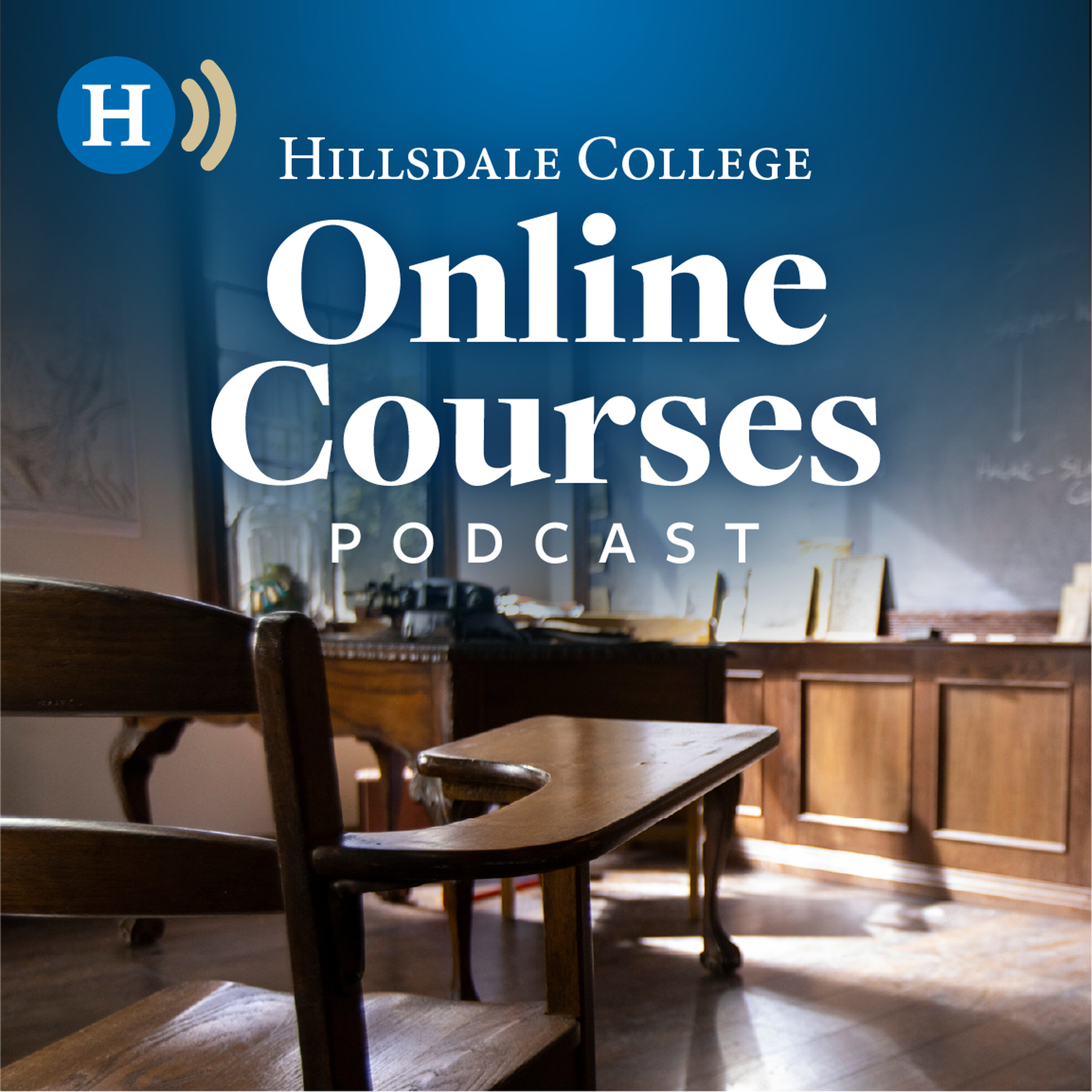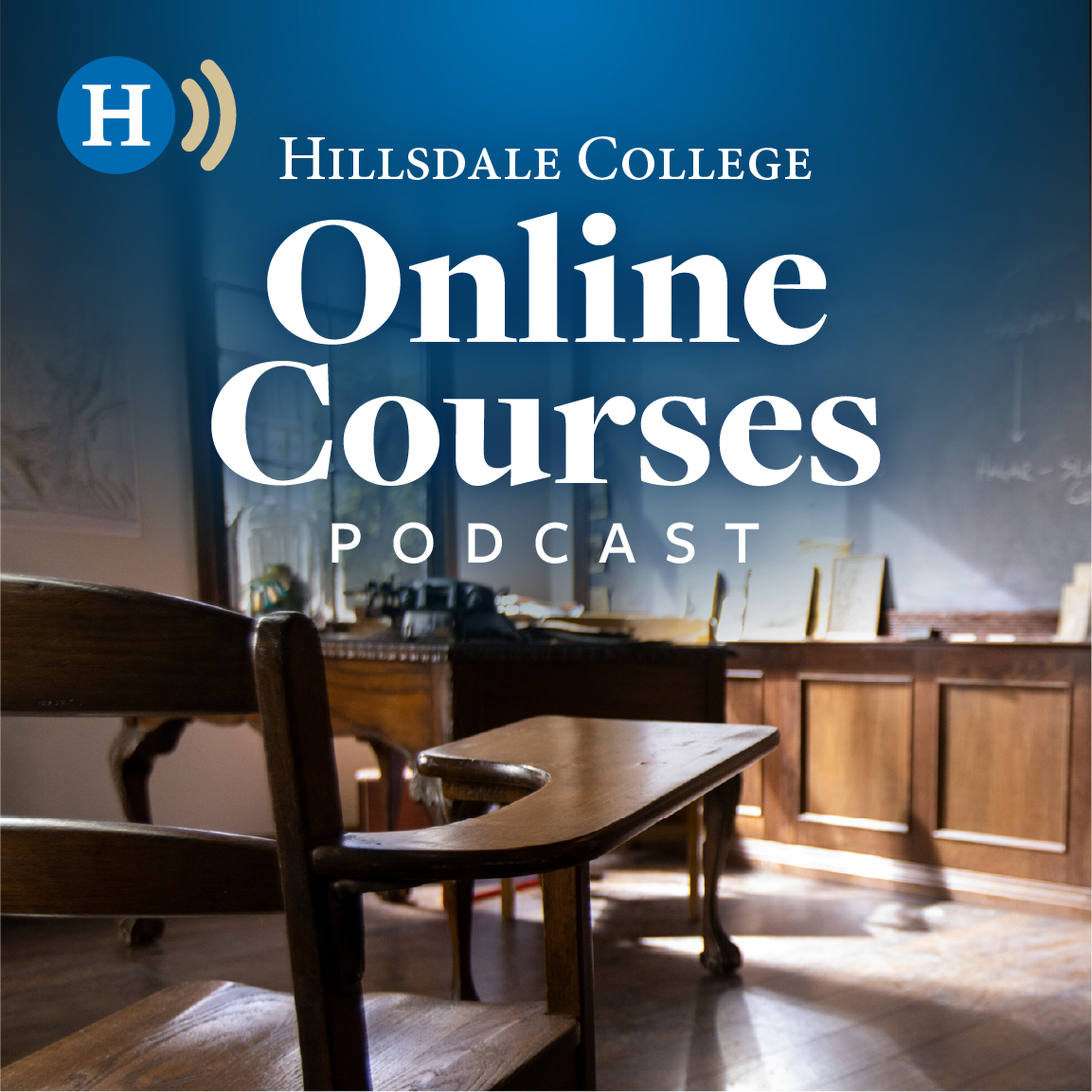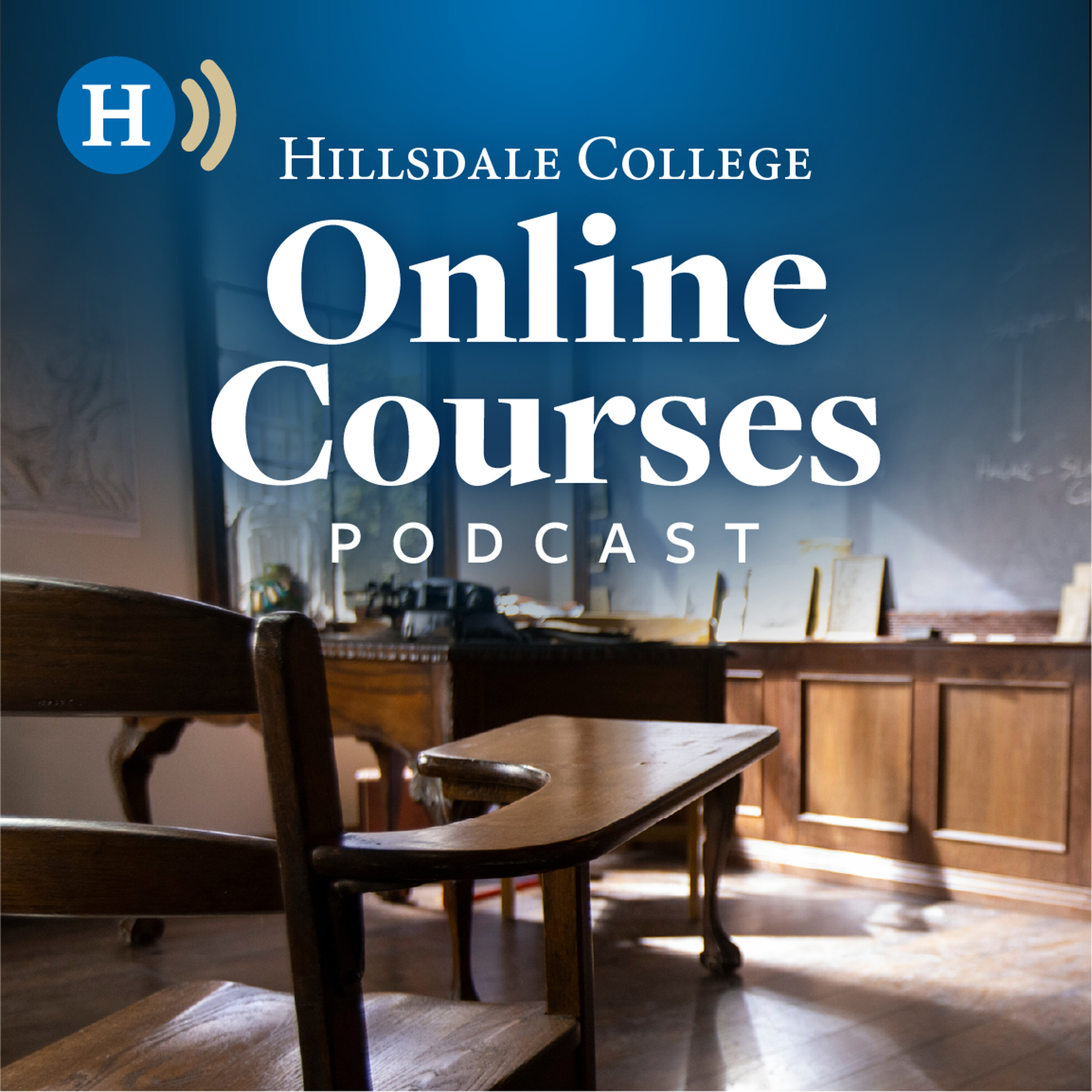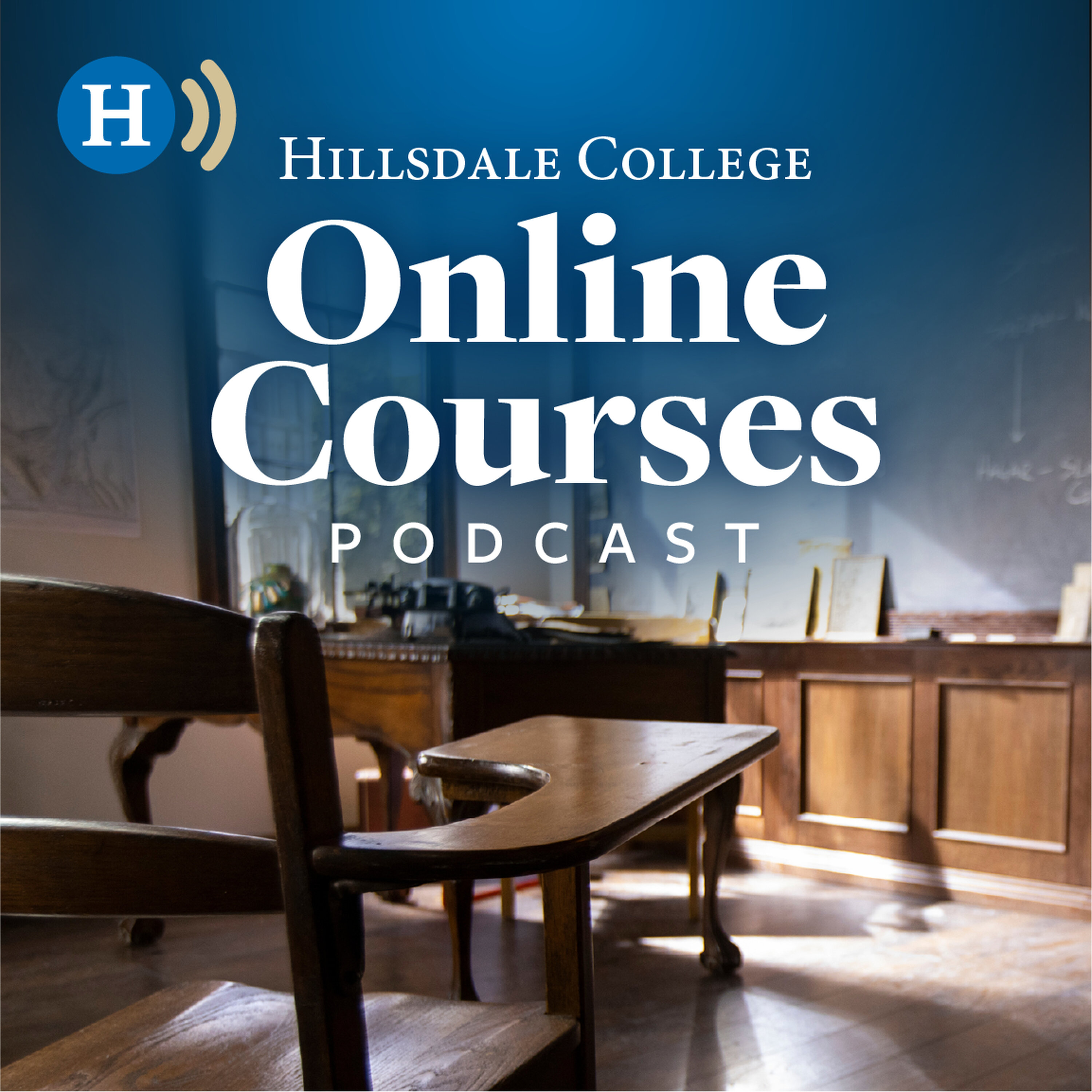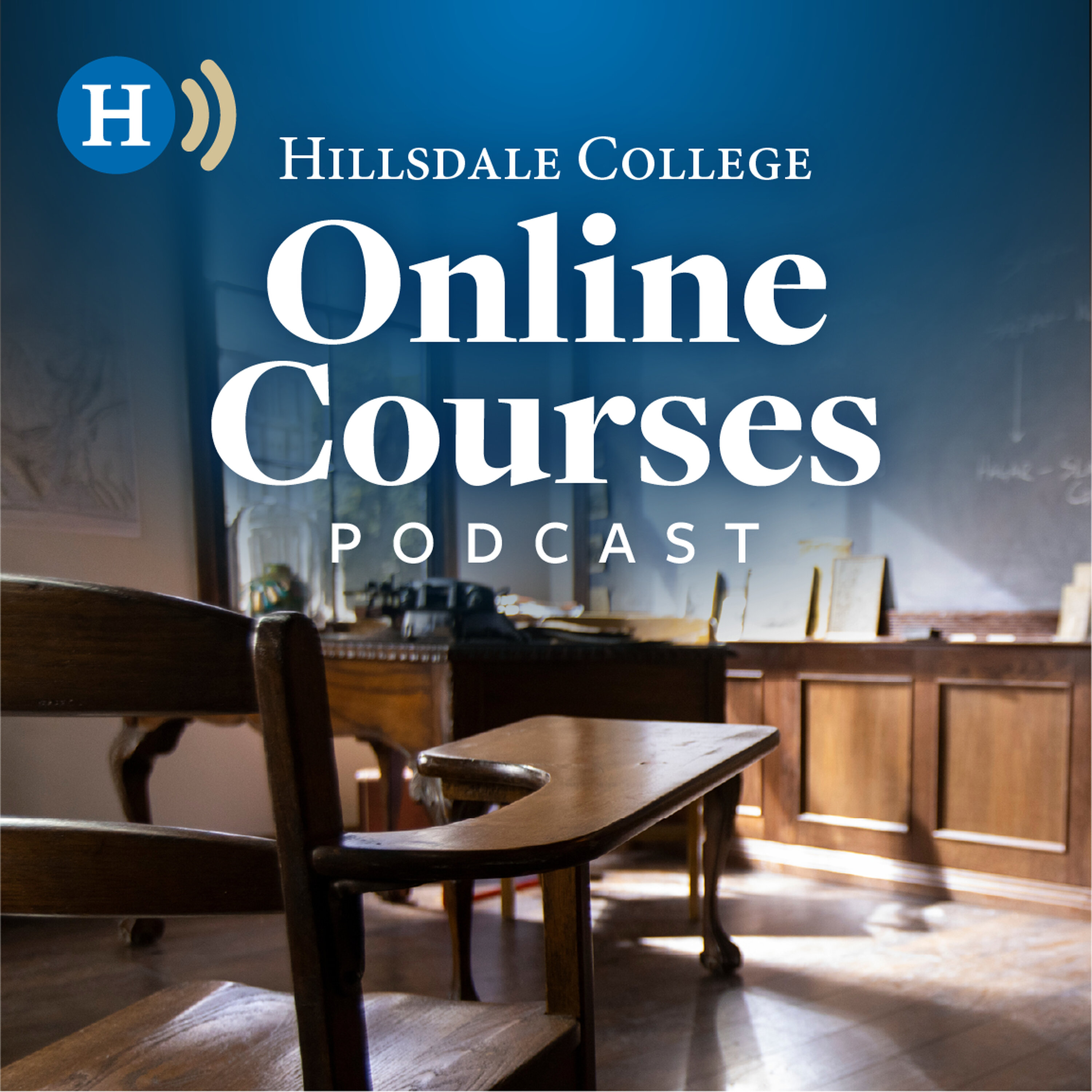Discover The Hillsdale College Online Courses Podcast
The Hillsdale College Online Courses Podcast

The Hillsdale College Online Courses Podcast
Author: Hillsdale College
Subscribed: 653Played: 12,030Subscribe
Share
Description
Hillsdale College was founded in 1844 with a mission to provide "all who wish to learn" the education necessary to preserve the civil and religious liberties of America. This Podcast, hosted by Hillsdale Online Learning Directors Kyle Murnen and Juan Davalos, expands that mission to a whole new audience. The Hillsdale Online Courses Podcast brings free, full online courses to your podcast feed, with introductory commentary.
116 Episodes
Reverse
On this episode of The Hillsdale College Online Courses Podcast, Jeremiah and Juan discuss C.S. Lewis' understanding of prayer before introducing Michael Ward. C.S. Lewis’s writings bring the great questions of the Christian faith to life. Through his imaginative and invigorating style, Lewis answers these questions in ways that are compelling to those outside Christianity and energizing to those within the Christian faith. C.S. Lewis’s distinction between contemplation and enjoyment extended to his practice of the Christian faith through prayer and reading the Bible. Lewis viewed prayer as a challenge—a task to be completed—until he recognized prayer as our participation in the cycle of God talking to and for creation. Moreover, Lewis recognized that the Bible is best understood and enjoyed by focusing on Christ as the interpretive key that unites the written Word.See omnystudio.com/listener for privacy information.
On this episode of The Hillsdale College Online Courses Podcast, Jeremiah and Juan discuss the multifaceted nature of C.S. Lewis' worldview before introducing Michael Ward. C.S. Lewis’s writings bring the great questions of the Christian faith to life. Through his imaginative and invigorating style, Lewis answers these questions in ways that are compelling to those outside Christianity and energizing to those within the Christian faith. C.S. Lewis’s account of his conversion in Surprised by Joy makes a crucial distinction between contemplation and enjoyment. While Lewis understood the place for theoretical knowledge in the Christian life, he believed it was secondary to the enjoyment of participating fully in the experience of the faith.See omnystudio.com/listener for privacy information.
On this episode of The Hillsdale College Online Courses Podcast, Jeremiah and Juan discuss how we often reach our lowest point before understanding our need for God before introducing Michael Ward. C.S. Lewis’s writings bring the great questions of the Christian faith to life. Through his imaginative and invigorating style, Lewis answers these questions in ways that are compelling to those outside Christianity and energizing to those within the Christian faith. The universal human experiences of shame and guilt attest not only to the existence of an objective moral law, but also a moral law giver. Christian conversion calls believers to live according to the moral law by first dying to their old life and then rising to a place higher than before. C.S. Lewis illustrates this bittersweet, downward-then-upward pattern of conversion in several of his fictional and philosophical works. See omnystudio.com/listener for privacy information.
On this episode of The Hillsdale College Online Courses Podcast, Jeremiah and Juan introduce the course "C.S. Lewis on Christianity". C.S. Lewis’s writings bring the great questions of the Christian faith to life. Through his imaginative and invigorating style, Lewis answers these questions in ways that are compelling to those outside Christianity and energizing to those within the Christian faith. Lewis argues that morality is not only objective, but also that it is universally understood as such. He explains that the awareness of these axiomatic moral truths—what he calls “the Tao” in The Abolition of Man—is what makes us human, and thus our very humanity is threatened by the rise of subjectivism in the West. See omnystudio.com/listener for privacy information.
Visit hillsdale.edu/course to view the paintings referenced in this lecture. On this episode of The Hillsdale College Online Courses Podcast, Jeremiah Regan and professor emeritus of art Sam Knecht discuss what we can learn about America's greatest victories through paintings of famous battles. Great artists perceive something that is difficult to capture and portray it with a beauty that makes it easier for us to grasp. These American paintings present the American character and make us proud to be Americans. This course explores inspiring portraits of statesmen, cherished images of common citizens, breathtaking landscapes of the American countryside, the hidden beauty of America’s city streets, and harrowing but fortifying glimpses of battle. American art is characterized by honesty. These artists attempt to balance a faithful replica of reality with a depiction of the ideal we seek. The color, light, and movement captured in brushstrokes on canvas provide a unique glimpse of the American character. American freedom was won and is maintained on the field of battle. Artists capture the courage and valor so characteristic of Americans in these war paintings. Click here to enroll in this course: http://hillsdale.edu/courseSee omnystudio.com/listener for privacy information.
Visit hillsdale.edu/course to view the paintings referenced in this lecture. On this episode of The Hillsdale College Online Courses Podcast, Jeremiah Regan and professor emeritus of art Sam Knecht discuss what paintings of everyday Americans can tell us about the American character. Great artists perceive something that is difficult to capture and portray it with a beauty that makes it easier for us to grasp. These American paintings present the American character and make us proud to be Americans. This course explores inspiring portraits of statesmen, cherished images of common citizens, breathtaking landscapes of the American countryside, the hidden beauty of America’s city streets, and harrowing but fortifying glimpses of battle. American art is characterized by honesty. These artists attempt to balance a faithful replica of reality with a depiction of the ideal we seek. The color, light, and movement captured in brushstrokes on canvas provide a unique glimpse of the American character. America exists of, by, and for the people. These paintings feature ordinary American citizens exercising their freedom, defending their rights, laboring for their property, and loving their neighbors. Click here to enroll in this course: http://hillsdale.edu/courseSee omnystudio.com/listener for privacy information.
Visit hillsdale.edu/course to view the paintings referenced in this lecture. On this episode of The Hillsdale College Online Courses Podcast, Jeremiah Regan and professor emeritus of art Sam Knecht discuss the unique character of American landscape paintings. Great artists perceive something that is difficult to capture and portray it with a beauty that makes it easier for us to grasp. These American paintings present the American character and make us proud to be Americans. This course explores inspiring portraits of statesmen, cherished images of common citizens, breathtaking landscapes of the American countryside, the hidden beauty of America’s city streets, and harrowing but fortifying glimpses of battle. American art is characterized by honesty. These artists attempt to balance a faithful replica of reality with a depiction of the ideal we seek. The color, light, and movement captured in brushstrokes on canvas provide a unique glimpse of the American character. America’s sprawling countryside, majestic waterfalls, and soaring mountains inspire our artists to capture the freedom that suffuses the very air. Bustling cities, meanwhile, are fertile settings for presenting the beauty of everyday life. Click here to enroll in this course: http://hillsdale.edu/courseSee omnystudio.com/listener for privacy information.
Visit hillsdale.edu/course to view the paintings referenced in this lecture. On this episode of The Hillsdale College Online Courses Podcast, Jeremiah Regan and professor emeritus of art Sam Knecht introduce the course "American Paintings." Great artists perceive something that is difficult to capture and portray it with a beauty that makes it easier for us to grasp. These American paintings present the American character and make us proud to be Americans. This course explores inspiring portraits of statesmen, cherished images of common citizens, breathtaking landscapes of the American countryside, the hidden beauty of America’s city streets, and harrowing but fortifying glimpses of battle. American art is characterized by honesty. These artists attempt to balance a faithful replica of reality with a depiction of the ideal we seek. The color, light, and movement captured in brushstrokes on canvas provide a unique glimpse of the American character. The American patriots depicted in these paintings, from our Founding Fathers through our more recent statesmen, inspire us to live up to the principles and promise of America.See omnystudio.com/listener for privacy information.
On this episode of The Hillsdale College Online Courses Podcast, Jeremiah and Juan discuss the long-term ramifications of the fall of the Soviet Union before introducing Michael Anton. We often treat foreign policy as a mystery that can only be understood by an enlightened few who have committed their lives to understanding the complexities of international life. This view is dangerous because it encourages citizens to ignore a critical aspect of American political life that it’s our duty to understand. And it’s false because the basics of foreign policy are commonsense and a joy to learn. For the Founders, the basic premise of foreign policy is simple—we must make every decision with a view towards securing the equal, natural rights of American citizens. This understanding requires that America’s leaders remain accountable to the people, and it places essential limits on our interventions abroad. Yet, for over a century, this traditional understanding of American foreign policy has been challenged by new and more ambitious doctrines that argue for increased American involvement and leadership abroad. After the collapse of the Soviet Union, America was left as the sole great power on the world stage, which led many Americans to expect a return to noninterventionist policies. But the foreign policy establishment argued that America as the sole great power left in the world had a responsibility of leading in a new international order. The threat of global terrorism entrenched this new role. See omnystudio.com/listener for privacy information.
On this episode of The Hillsdale College Online Courses Podcast, Jeremiah and Juan discuss the long-term ramifications of the fall of the Soviet Union before introducing Michael Anton. We often treat foreign policy as a mystery that can only be understood by an enlightened few who have committed their lives to understanding the complexities of international life. This view is dangerous because it encourages citizens to ignore a critical aspect of American political life that it’s our duty to understand. And it’s false because the basics of foreign policy are commonsense and a joy to learn. For the Founders, the basic premise of foreign policy is simple—we must make every decision with a view towards securing the equal, natural rights of American citizens. This understanding requires that America’s leaders remain accountable to the people, and it places essential limits on our interventions abroad. Yet, for over a century, this traditional understanding of American foreign policy has been challenged by new and more ambitious doctrines that argue for increased American involvement and leadership abroad. After the collapse of the Soviet Union, America was left as the sole great power on the world stage, which led many Americans to expect a return to noninterventionist policies. But the foreign policy establishment argued that America as the sole great power left in the world had a responsibility of leading in a new international order. The threat of global terrorism entrenched this new role. See omnystudio.com/listener for privacy information.
On this episode of The Hillsdale College Online Courses Podcast, Jeremiah and Juan discuss the ever-present threat of nuclear annihilation before introducing Michael Anton. We often treat foreign policy as a mystery that can only be understood by an enlightened few who have committed their lives to understanding the complexities of international life. This view is dangerous because it encourages citizens to ignore a critical aspect of American political life that it’s our duty to understand. And it’s false because the basics of foreign policy are commonsense and a joy to learn. For the Founders, the basic premise of foreign policy is simple—we must make every decision with a view towards securing the equal, natural rights of American citizens. This understanding requires that America’s leaders remain accountable to the people, and it places essential limits on our interventions abroad. Yet, for over a century, this traditional understanding of American foreign policy has been challenged by new and more ambitious doctrines that argue for increased American involvement and leadership abroad. The rise of nuclear power and the doctrine of mutually assured destruction kept the Cold War from erupting into outright war between the great powers. The superior industrial and technological capacity of the United States enabled America to outlast the Soviet Union. See omnystudio.com/listener for privacy information.
On this episode of The Hillsdale College Online Courses Podcast, Jeremiah and Juan discuss the unique threat of international communism before introducing Michael Anton. We often treat foreign policy as a mystery that can only be understood by an enlightened few who have committed their lives to understanding the complexities of international life. This view is dangerous because it encourages citizens to ignore a critical aspect of American political life that it’s our duty to understand. And it’s false because the basics of foreign policy are commonsense and a joy to learn. For the Founders, the basic premise of foreign policy is simple—we must make every decision with a view towards securing the equal, natural rights of American citizens. This understanding requires that America’s leaders remain accountable to the people, and it places essential limits on our interventions abroad. Yet, for over a century, this traditional understanding of American foreign policy has been challenged by new and more ambitious doctrines that argue for increased American involvement and leadership abroad. After World War Two, Europe was weakened and America was the only power capable of standing against Soviet communism. We pursued a policy of containment and intervened in smaller nations to stop the spread of communism rather than directly confront the Soviet Union. See omnystudio.com/listener for privacy information.
On this episode of The Hillsdale College Online Courses Podcast, Jeremiah and Juan discuss the legacy of World War Two before introducing Michael Anton. We often treat foreign policy as a mystery that can only be understood by an enlightened few who have committed their lives to understanding the complexities of international life. This view is dangerous because it encourages citizens to ignore a critical aspect of American political life that it’s our duty to understand. And it’s false because the basics of foreign policy are commonsense and a joy to learn. For the Founders, the basic premise of foreign policy is simple—we must make every decision with a view towards securing the equal, natural rights of American citizens. This understanding requires that America’s leaders remain accountable to the people, and it places essential limits on our interventions abroad. Yet, for over a century, this traditional understanding of American foreign policy has been challenged by new and more ambitious doctrines that argue for increased American involvement and leadership abroad. America was officially neutral during the first two years of World War Two, but in many important ways our “neutrality” violated the nonintervention principles of the American Founders. The attack on Pearl Harbor led Americans to accept war. And with the rising Soviet threat at the end of the War, American public opinion accepted interventionist policies. See omnystudio.com/listener for privacy information.
On this episode of The Hillsdale College Online Courses Podcast, Jeremiah and Juan discuss American foreign policy in the wake of World War One before introducing Michael Anton. We often treat foreign policy as a mystery that can only be understood by an enlightened few who have committed their lives to understanding the complexities of international life. This view is dangerous because it encourages citizens to ignore a critical aspect of American political life that it’s our duty to understand. And it’s false because the basics of foreign policy are commonsense and a joy to learn. For the Founders, the basic premise of foreign policy is simple—we must make every decision with a view towards securing the equal, natural rights of American citizens. This understanding requires that America’s leaders remain accountable to the people, and it places essential limits on our interventions abroad. Yet, for over a century, this traditional understanding of American foreign policy has been challenged by new and more ambitious doctrines that argue for increased American involvement and leadership abroad. World War One marks the rise of the new progressive foreign policy among American elites who sought to spread American principles abroad and make the world safe for democracy. But the American public still largely opposed foreign interventions, and after the Great War, they elected presidents who promised to avoid foreign entanglements and return to a noninterventionist policy. See omnystudio.com/listener for privacy information.
On this episode of The Hillsdale College Online Courses Podcast, Jeremiah and Juan discuss the birth of American empire before introducing Michael Anton. We often treat foreign policy as a mystery that can only be understood by an enlightened few who have committed their lives to understanding the complexities of international life. This view is dangerous because it encourages citizens to ignore a critical aspect of American political life that it’s our duty to understand. And it’s false because the basics of foreign policy are commonsense and a joy to learn. For the Founders, the basic premise of foreign policy is simple—we must make every decision with a view towards securing the equal, natural rights of American citizens. This understanding requires that America’s leaders remain accountable to the people, and it places essential limits on our interventions abroad. Yet, for over a century, this traditional understanding of American foreign policy has been challenged by new and more ambitious doctrines that argue for increased American involvement and leadership abroad. In the Spanish-American War, America intervened in the internal affairs of a European colony in the Western Hemisphere. As a result of the war, America acquired territories that it ruled with no intention of admitting to statehood, fundamentally changing the nature of American foreign policy. See omnystudio.com/listener for privacy information.
On this episode of The Hillsdale College Online Courses Podcast, Jeremiah and Juan discuss the early foreign policy decisions of the American republic before introducing Michael Anton. We often treat foreign policy as a mystery that can only be understood by an enlightened few who have committed their lives to understanding the complexities of international life. This view is dangerous because it encourages citizens to ignore a critical aspect of American political life that it’s our duty to understand. And it’s false because the basics of foreign policy are commonsense and a joy to learn. For the Founders, the basic premise of foreign policy is simple—we must make every decision with a view towards securing the equal, natural rights of American citizens. This understanding requires that America’s leaders remain accountable to the people, and it places essential limits on our interventions abroad. Yet, for over a century, this traditional understanding of American foreign policy has been challenged by new and more ambitious doctrines that argue for increased American involvement and leadership abroad. American foreign policy remained fairly consistent throughout the first century of the republic. The early policies centered on growing into a strong nation and maintaining our unique position by preventing European powers from becoming powerful threats in the Western Hemisphere. See omnystudio.com/listener for privacy information.
On this episode of The Hillsdale College Online Courses Podcast, Jeremiah and Juan introduce the course "American Foreign Policy." We often treat foreign policy as a mystery that can only be understood by an enlightened few who have committed their lives to understanding the complexities of international life. This view is dangerous because it encourages citizens to ignore a critical aspect of American political life that it’s our duty to understand. And it’s false because the basics of foreign policy are commonsense and a joy to learn. For the Founders, the basic premise of foreign policy is simple—we must make every decision with a view towards securing the equal, natural rights of American citizens. This understanding requires that America’s leaders remain accountable to the people, and it places essential limits on our interventions abroad. Yet, for over a century, this traditional understanding of American foreign policy has been challenged by new and more ambitious doctrines that argue for increased American involvement and leadership abroad. The Founders believed that sovereign nations, like individuals, cannot be ruled without their consent. The aim of American foreign policy is to secure the nation, the rights of our citizens, and our national honor. See omnystudio.com/listener for privacy information.
On this episode of The Hillsdale College Online Courses Podcast, Jeremiah and Juan discuss the role that the judiciary plays in our republic before introducing Dr. Ronald J. Pestritto. In a republic, every citizen has a duty to understand their government. The Federalist is the greatest exposition of representative government and the institutional structure of the Constitution. It explains how the Constitution established a government strong enough to secure the rights of citizens and safe enough to wield that power. This course will examine how Publius understood human nature and good government, and why he argued that the only true safeguard of liberty lies in the vigilance of the American people. The courts must be independent to decide particular cases without undue influence. The separation of powers is a safeguard against tyranny, but the security of a republic lies in the vigilance of the people.See omnystudio.com/listener for privacy information.
On this episode of The Hillsdale College Online Courses Podcast, Jeremiah and Juan discuss the nature of executive power before introducing Dr. Ronald J. Pestritto. In a republic, every citizen has a duty to understand their government. The Federalist is the greatest exposition of representative government and the institutional structure of the Constitution. It explains how the Constitution established a government strong enough to secure the rights of citizens and safe enough to wield that power. This course will examine how Publius understood human nature and good government, and why he argued that the only true safeguard of liberty lies in the vigilance of the American people. The executive requires energy, efficiency, and dispatch to enforce the laws that are passed by the legislature.See omnystudio.com/listener for privacy information.
On this episode of The Hillsdale College Online Courses Podcast, Jeremiah and Juan discuss the role that the Senate used to play in our republic before introducing Dr. Ronald J. Pestritto. In a republic, every citizen has a duty to understand their government. The Federalist is the greatest exposition of representative government and the institutional structure of the Constitution. It explains how the Constitution established a government strong enough to secure the rights of citizens and safe enough to wield that power. This course will examine how Publius understood human nature and good government, and why he argued that the only true safeguard of liberty lies in the vigilance of the American people. The Senate provides stability to the government and accountability for the far-reaching effects of laws, which contribute to our national character in the eyes of foreign nations.See omnystudio.com/listener for privacy information.



